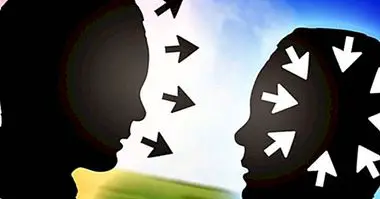The 3 personality types related to psychopathy
Psychopathy is a disorder in which the individual he does not feel remorse in situations that he would be expected to feel or cause harm to others . However, there are different degrees of psychopathy, and types of personality traits associated with this phenomenon.
- Related article: "Psychopathy: what happens in the mind of the psychopath?"
Personality types associated with psychopathy
Depending on the type of psychopathy, Ronald Blackburn proposed 4 types of psychopaths: the primary psychopath can be very extroverted, impulsive, hostile and aggressive; Introverted with the same previous traits, which is called as a secondary psychopath. On the other hand there is one who has a great need for control, is always on the defensive, has high self-esteem and keeps his anxiety at low levels so he is called controlled psychopath. He who is withdrawn, shy, anxious and with a low level of self-esteem is called inhibited psychopath.
On the other hand, within the classification of personalities, there are some that by their characteristics have a high relationship with psychopathic behavior. Next, each one is described:
1. Paranoid personality
They tend to be distrustful, suspicious, suspicious and resentful. They can interpret external signals as hostile or threatening even if they do not have that intention. If someone hurts them, they seek revenge. When they feel threatened they choose to attack before they are attacked; they use reactive violence . This personality is highly related to crimes of passion.
2. Schizoid personality
They are usually isolated people, can be considered by others as "rare" . They avoid relating to others and if they have to establish contact, this represents a discomfort for them. They tend to be apathetic and insensitive. This personality is related to highly violent crimes, since they use instrumental violence, so they have time to plan the crime with the "cold head" and they are 100% focused on doing harm.
3. Antisocial personality
This personality may be observable from childhood, since children with it tend to frighten others and mistreat animals. Easily break rules , they seek immediate satisfaction in their actions; they use reactive violence. They tend to blame their victims, as if they had provoked them and forced sexual relations.
- Maybe you're interested: "The 9 subtypes of Psychopathy according to Theodore Millon"
Two variants of criminal psychopathy
Within the criminal psychopathy you can make a classification of:
Organized criminal
He is the one who plans his behavior, thinks of everything; in how to catch, how to commit the crime, where, what to do with the victim. He uses instrumental violence, causes pleasure both the execution and the damage caused, is moved by the crime to commit.
Choose your victims carefully , since these mean something within the fantasy of the crime, they must fulfill certain characteristics. It is possible to identify a modus operandi, the crime scene can be modified to represent something. Neurobiologically, there is a high degree of activation in the amygdala and in the orbitofrontal cortex, which allows for a planning of its actions.
Criminal disorganized
One who he does not regulate his behavior, he is impulsive before the stimulus that causes him discomfort or rage . It uses reactive violence, which means that it "acts hot." It has a great need to act so it does not choose its victim, it can be any person, therefore they are usually called "opportunity crimes". Just look for a means to download. It is difficult to find a pattern unlike the organized criminal.
In the neurobiological aspect, unlike the previous one, there is little or no activity in the orbitofrontal cortex, so there is no inhibitory control. He is hypersensitive to social and emotional issues, there is a distortion in his social cognition. And, like the organized, there is a high activation in the amygdala.
What to do to intervene psychologically?
Although there is no specific treatment for psychopathy, there are suggestions for intevention. It is recommended that therapies focused on behavior be given , you must work with awareness of the consequences of the acts performed by the person, control over themselves, self-observation and not seek immediate rewards. It is important to promote critical thinking, the meaning of emotions, feelings and perceptions. Work on the external control locus. Within the psychopharmacological treatment, drugs that inhibit aggressiveness and / or impulses are used.



















